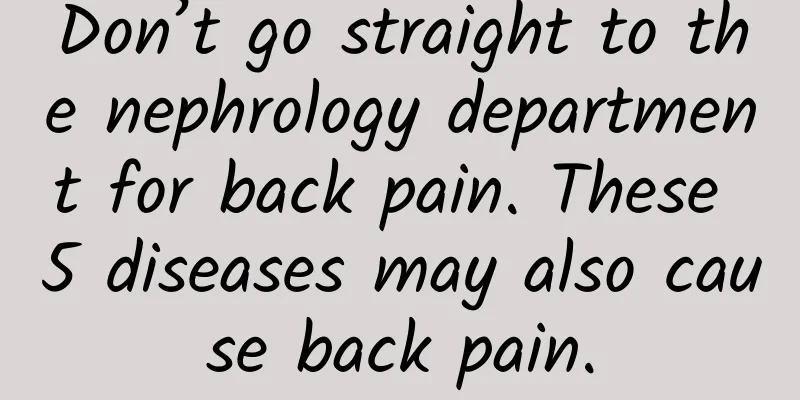Don’t go straight to the nephrology department for back pain. These 5 diseases may also cause back pain.

|
In our real life, we often encounter such questions as "I have low back pain recently, maybe I have kidney disease", and some people joke that low back pain is "kidney deficiency". Many patients with low back pain often go to the outpatient department of nephrology. After asking about the medical history, physical examination and laboratory tests, the doctor finds that it is indeed not kidney disease. In fact, there are many reasons for low back pain, and low back pain caused by kidney problems is one of the reasons. So, what diseases can cause low back pain, and how to judge whether low back pain is caused by kidney disease or other diseases? What diseases are common in causing low back pain and what are their characteristics? (1) Lumbar muscle strain: This is a common disease in the outpatient department of nephrology due to low back pain. It is often caused by excessive fatigue, inappropriate physical activity, lifting heavy objects or being in a fixed position for a long time. It usually manifests as soreness and dull pain in the waist, which worsens after fatigue and is relieved during rest. There is obvious tenderness in the psoas major muscles on both sides. (2) Lumbar disc herniation: Patients with lumbar disc herniation often have a history of carrying excessively heavy objects, and it can also be caused by lumbar trauma. In recent years, the incidence of this disease has increased significantly among office workers, which is caused by long-term lack of exercise of the lumbar muscles and atrophy of the lumbar muscles. The disease can occur suddenly or slowly, manifested as low back pain, aggravated pain when bending over, aggravated when coughing or sneezing, inability to bear weight, and relief when resting in bed. As the degree of disc herniation worsens, lower limb pain, numbness, sciatica, and even affect bowel and urination functions may occur. (3) Spondylitis: This type of disease includes ankylosing spondylitis, hyperplastic spondylitis, and tuberculous spondylitis. Ankylosing spondylitis is characterized by stiffness and pain in the waist and back and spinal deformity. Hyperplastic spondylitis is manifested by back pain, soreness, and stiffness in the morning, but it can be relieved after movement, and the pain will be aggravated by excessive movement. In addition to back pain and limited movement, tuberculous spondylitis is often accompanied by symptoms of tuberculosis poisoning such as poor appetite, low fever in the afternoon, fatigue, and weight loss. (4) Digestive system diseases: Some digestive system diseases can also manifest as pain in the lower back, such as gastric and duodenal ulcers, acute and chronic pancreatitis, chronic cholecystitis, etc. These diseases are often combined with other manifestations of digestive system diseases, such as acid reflux, belching, hiccups, aversion to greasy food, upper abdominal pain, etc., and are clearly related to eating. (5) Pelvic organ diseases: In this category, if men experience lumbar pain accompanied by frequent urination, urgency, difficulty urinating, and increased nocturia, they may have prostatitis or prostatic hyperplasia. Women often experience lumbar pain and abdominal distension, which may indicate chronic adnexitis, cervicitis, uterine prolapse, pelvic inflammatory disease, or tumors. (6) Kidney disease: Kidney stones, acute and chronic pyelonephritis, chronic kidney disease, etc. can all cause low back pain. Kidney stones and ureteral stones can both cause severe low back pain, which is like "a knife twisting". Patients often have nausea, sweating, frequent urination, urgency, and pain when urinating, and some patients will have fever. Acute and chronic pyelonephritis is common in women. In acute inflammation, the patient may experience soreness, dull pain, and distending pain in the waist, and may also be accompanied by chills, high fever, frequent urination, urgency, and pain when urinating. Patients with chronic kidney disease may also experience low back pain symptoms, but more importantly, these patients often have edema, hypertension, proteinuria, hematuria, and may also be accompanied by varying degrees of renal impairment. There are many diseases that cause low back pain, and you cannot simply assume that low back pain is caused by kidney disease. After experiencing low back pain symptoms, you should make a preliminary self-diagnosis and choose the right department for consultation. If you suspect lumbar muscle strain, lumbar disc herniation, or spondylitis, you may need to see an orthopedic doctor; if you suspect a kidney problem, you need to see a nephrologist. When registering, you can also consult the triage staff to ensure that you are registered with the most appropriate department. |
<<: Understand in one article why the elderly are prone to frequent urination?
Recommend
Cervical hypertrophy is very harmful and can lead to infertility in severe cases
Cervical hypertrophy is one of the more common gy...
In what environment does Agrocybe agrocybe grow? Nutritional content of Agrocybe agrocybe
Tea tree mushrooms contain many kinds of amino ac...
Why can't you eat fruit during menstruation?
Menstruation is a physiological phenomenon unique...
Prevention of cerebrovascular disease starts with ultrasonography of brain and neck vessels
Author: Jia Lingyun, Chief Physician, Xuanwu Hosp...
2 years after bilateral oophorectomy
The ovaries are the most critical organs in the f...
Episiotomy wound with granulation picture
When giving birth, many mothers choose natural bi...
Do I need an IV drip after a normal birth?
Natural birth is different from caesarean section...
Can corn heart be used to smoke bacon? What is the most fragrant smoked bacon?
We all know that bacon is a common delicacy. It i...
More and more people are diagnosed with thyroid problems. Is it caused by staying up late and being under a lot of stress?
Many people have similar doubts: going to the hos...
What causes women to get angry?
There is a saying that goes, "A woman's ...
What is the reason for frequent menstruation?
Some people may feel that their menstrual periods...
Blood streaks after urination in women
The structure of women's reproductive organs ...
Can wolfberry be consumed with milk? When is the best time to consume black wolfberry?
Goji berries contain organic acids, so most of th...
I had my period 40 days after the abortion and it hasn't come yet.
If your period still hasn't come after more t...
How does a retroverted uterus reset itself?
Retroverted uterus is a common uterine problem in...









